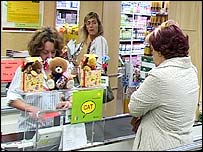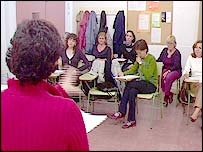|
The Spanish region of Catalonia, which has a large degree of
autonomy from the government in Madrid is known for being fiercely
proud of its individual culture and local language.
Soaring immigration levels though mean that, these days, Catalan is less likely to be heard on the streets.

Some staff have been told to speak only in Catalan to customers
|
With regional elections scheduled this Sunday, the Catalan government has been keen to show its nationalist credentials.
It has launched an integration campaign, aimed at
immigrants but promoting the every day use of Catalan - rather than
Spanish - amongst the region's inhabitants old and new.
Jordi Ruger, of the regional government's linguistics department has spear-headed the campaign.
He brushes aside any suggestion that it may harbour racist undertones.
"We don't like to speak of a threat or an immigration problem," he said.
"To what end would that be? In Catalonia we realise that
immigration is a fact of life but what we want to ensure is that the
Catalan language also remains a fact of everyday life here - in the
schools, the universities, businesses, the courts and in bars and
bakeries too."
In affluent Catalonia, he tells me, the language debate
is not a sign of hostile anti-immigrant sentiment but rather part of a
determined effort to remain culturally distinct from the rest of Spain.
CAT campaign
"We faced a similar challenge in the
1960's and 70's when we were again flooded with immigrants - this time
though from other parts of Spain," he said. "Then, as now, we
encouraged people to learn our language. I'm confident that we'll be
successful again."
Jordi Pujol, the grand old man of conservative Catalan
politics and Catalonia's president, describes the drive to integrate
all immigrants as a survival tactic.
Sitting aside an enormous Catalan flag in his Barcelona
office he said his region had fought for its cultural independence from
Spain for 3 centuries and that immigration should not overshadow the
Catalan identity.
"We must treat people humanely," he told me. "Most come
from north Africa or South America and are very poor - but the key for
Catalonia is successful integration."
The CAT-campaign as it's been nick-named has been launched across the region.
CAT posters in and outside bars, restaurants and shops
indicate the staff there have been instructed to speak Catalan with all
customers, wherever they come from.
At the check-out counter of a participating supermarket
I asked some students from Barcelona University what they thought of
the regional government's campaign?
Their reaction was mixed. Tanit thought the campaign was
a definite vote-winner and that people needed the push to learn
Catalan.
Edgar worried that some immigrants might object to the campaign but thought it was practical.
"Catalans are very polite people," he said. "If they
have any idea that you may not speak Catalan well, they immediately
speak to you in Spanish, but with more and more foreigners here that
means less and less Catalan is being spoken."
Language lessons
Maria objected to the idea that immigrants were being forced to learn Catalan.
"Catalonia is also part of Spain," she said. "People should be given the choice to speak Spanish."
Immigrants to Catalonia are given a choice, of sorts.
They can attend government Catalan classes for free, or pay for Spanish
lessons out of their own pocket.

Immigrants are offered free Catalan classes
|
So far it's a deal that many immigrants and their support groups appear to be accepting.
Veronika Tan from Singapore attends weekly Catalan
classes. She said there was never any doubt in her mind that she had to
learn Catalan - without it she was unable to communicate with her
boyfriend's friends or family, go food shopping or find a job.
It can certainly be an isolating experience living in Catalonia and not speaking Catalan.
More than 80% of Catalans use their language in their everyday lives.
I took advantage of my visit to Barcelona to watch an FC Barcelona home game at Camp Nou.
Identity
Although he's only on a one-year transfer from Arsenal,
the Dutch player Giovanni van Bronckhorst assured me he'd soon be
taking Catalan lessons.
"How else can you really understand what makes people
tick here?" he said. "Even as a foreigner you definitely get the
feeling that here, you're living in Catalonia, not Spain."
So is the CAT-campaign really necessary?
Certainly the Catalan government has been criticised by those who feel it pushes and politicises the language issue too much.
Manuel Fuentes is a DJ on Barcelona's Radio CAT. There
he broadcasts in Catalan but he also travels once a week to Madrid
where he presents a TV show in Spanish.
Manuel says he doesn't see what all the fuss is about.
"Language is simply a means of communication for me. I
grew up here in Catalonia with both languages - my mother is Catalan
and my father from the north of Spain. There is no conflict."
Yet looking around at the elections posters smothering
the streets of Barcelona there appears to be some sort of conflict but
this is not the typical anti-immigrant rant we've unfortunately become
so used to seeing in populist pre-election rallies across Europe.
Here the immigration debate has a distinctly Catalan
twist. Far from seeing them as a threat, some say the new arrivals in
Catalonia can help strengthen their regional struggle against being
swallowed up by a broader Spanish identity.
|